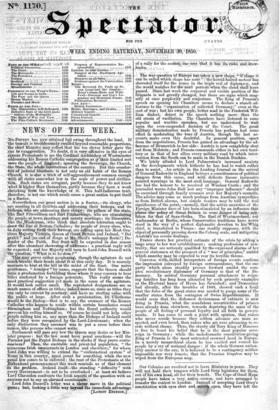The war q uestion bf 4§164,1hilti &ken a n ew shape, "
if'shape it can be called which shape has nolli the horrid-haired meteor 'has shrouded itself for the nonce in the triple veil of diplomacy, and the world watches foriffiti'illskti perteilt.-When :the cloud Shalt have passed. Since last week the corporeal and visible position of the litigants is not greatly changed, but there are signs which mag- nify at once perplexity and conjecture. The King of Prussia's speech on opening his Chambers seems to declare a stanch ad- herence to the organization of collected Germany," even at the cost of war but his ollyn people, better read in the Frederick Wil- liam dialect, detect in the speech nothing more than the old strain of vacillation. The Chambers have listened to- some popular and warlike speeches, but are understood to Wait upon the ever-suspended decision of the Court. The great military demonstration made by Prussia haa perhaps had some effect in moderating the tone of Austria, though the last ac- counts make even this doubtful. In -general position, apart from the negotiations, Prussia has gained an advantage by the ad- herence of Brunswick to her side : Austria is now completely shut out from Holstein.; and Prussia commands either in her own terri- tory or in that of her allies every military road by which inter- vention from the South eau be made in the Danish Dnchies. We lately alluded to Lord Palmerston's increased anxiety at the developments which hitherto he has .had to watch rather than to assist._ _.An article in the Leading Journal on the arrival of General Radowitz in England betrays a conseibusness of political dangers from this cause, and with delicate finesse insinuates pointed warnings ' in the most civil language: General Radowitz has had the honour to be received at Windsor Castle; and the journalist warns John Bull lest any "improper influence" should be exercised_through family avenues over her Majesty's councils, The advice may come as much perhaps from Austrian sympathies as from British alarms, but simple readers may be told the real significance of the point,—namely, that the active anxieties of the Foreign Minister have of late been stimulated by an influence that places -the policy of Great Britain in some danger of being mia- taken for that of Saxe-Gotha. The Earl a Westmoreland,- our Ambassador at Berlin, whose Conservative traditions have never stood in the way of a perfect diplomatic devotion to his-Whig chief, is transferred to 'Vienna: one readily supposes, with the object of personally pressing down the Coburg scale, and mitigating Austria's too severe dealings. France shows, her, practical' estimate of the crisis by adding a large army to her war establishment; making professions of acu- ity, that are seriously, qualified by the expressed alarms of her gravest statesmen at the prospect of a "war of principles," amidst which anarchy may be expected to rear its terrible throne. Converse withkskilled interpreters of foreign events confirms the impression conveyed by foreign correspondence, that the one party which alone steadily presses forward amidst the com- plex revolutionary diplomacy of Germany is that of the De- mocracy. In central Germany personal attachment to reign.. ing families has long been alienated by such princely- examples as the Electoral house of Hesse has furnished; and. Democracy had already; after the troubles of 1848, showed such a front that the force of the great states was needed to purge Some of the smaller states from the contagion of Swiss Republicanism. It would seem that the dishonest deviousness of cabinets is now doing in Prussia, what the scandalous eccentricities of princes have already done elsewhere, towards depriving the mass of the people of all feeling of personal loyalty and all faith in govern- ments It has come to suck a point with opinion, that rulers who never recede because they seldom advance are Morere- spected, and even loved, than rulers who are ever advancing to re- cede without shame. Thus, the sturdy; old Tory King, of Hanover is free to boast his belief that he is the most popular sove- reign in Germany; while the melodramatic constitution-giving Icing of Prussia is the Most untrusted crowned head in Europe. In a merely monarchical alarm he has excited and roused his people by a cry of national danger : if the whole German nation- ality answer to the cry,- it is bclieved to be a centingency neither impossible nor 'very remote, that the Prussian kingdom may be wiped fro& the' Europerm map.


























